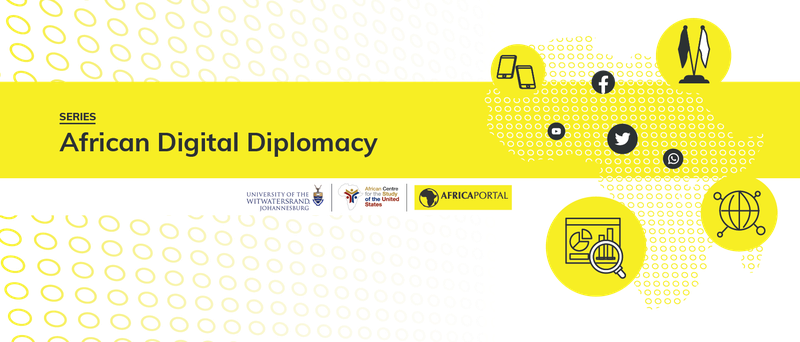This article is published in partnership with the African Centre for the Study of the United States (ACSUS) at Wits University.
The rise of digital technology and social media has significantly impacted diplomacy. Digital media technology has created channels through which individuals and institutions in the private and public sector can use Facebook, Twitter, Instagram, Whatsapp, YouTube and many others for international interactions. Governments’ foreign departments and ministries have also started to use digital diplomacy to engage with other countries to manage their image abroad. The internet has certainly brought about great changes in the way in which diplomacy is now being conducted.
However, the Nigerian government has not used such channels extensively even though the country’s public diplomacy strategy and impact has become more important given the role Nigeria plays across Africa. This paper examines the examples of Nigeria’s digital diplomacy to date and the effectiveness of this engagement.
What is digital diplomacy?
Digital diplomacy involves processes in which countries seek to accomplish their foreign goals by communicating with foreign populations to facilitate the acceptance of a certain policy. It involves the use of information and communication technologies (ICTs) and social media platforms to conduct public diplomacy.
Digital diplomacy also provides for two-way communication, as it gives countries the opportunity to engage with foreign publics and facilitate the creation of relationships between one state and another. Indeed, digital diplomacy has created the instance where a president can easily send a Whatsapp message to his matching part in another country that just won an election, or even express condolences at no cost.
However, the Nigerian government has not taken full advantage of these opportunities to create an active dialogue between itself and other countries.
Nigeria’s use of digital diplomacy
From the available data, it is clear that the government of Nigeria engages with other countries through various social media platforms, including: Twitter, Facebook, Whatsapp, Telegram and Instagram. The Nigerian Foreign Affairs Ministry, the Nigerians in Diaspora Commission and other agencies that legalise Nigeria’s image and stance on international issues have frequently used these social media platforms.
For instance, the Nigerian President has a Twitter handle and a Facebook page through which he personally communicates with his contemporaries abroad. The president has tweeted other leaders in Africa, Europe, Asia and America with whom he has various engagements.
In the same vein, the Nigerian Foreign Ministry and the Commission of Nigerians in Diaspora have posted several tweets to their counterparts in other countries for diplomatic convenience. A case in point is the diplomatic rumble between the Nigerian government and Ghana when the Nigerian High Commission in that country was demolished. Several conversations took place on social media between Nigerian foreign representatives and those from Ghana. Similarly, a diplomatic issue between the two countries over Nigerian businesses in Accra, where shops owned by Nigerians were shut down by the Ghanaian government, was also partially dealt with via social media.
There was also a case between Nigeria and Pakistan, when Nigerian citizens in that country were held against their will for several reasons and the issue was posted on social media. Currently, Nigeria is also active on social media over the political crisis ravaging Mali. Nigerian ambassadors abroad, such as in China, have also regularly used digital diplomacy in foreign countries for the sake of business or political interests.
Concluding remarks
It is suffice to say that most of the digital diplomatic communications entered into by Nigeria are reciprocal, or in give-and-take circumstances. The Nigerian government in several situations has only become responsive on social media when its house was on fire. In many instances, it is only when there was need for a rejoinder, retaliation or reaction that Nigerian diplomats have engaged social media. No deliberate initiative is often taken to enjoy diplomatic goodwill from international communities through digital diplomacy. This may not be unconnected to the fact that the Nigerian government has frequently condemned new media claiming that it is a channel for fake news.
The government is also apprehensive of the fact that it does not own or have any control over digital media and it therefore may not see it as a very official means of communication. This may be the case, even though the President of Nigeria and all of the country’s diplomats have their own personal Twitter handle, Facebook page and Instagram page. They also share WhatsApp and Telegram messages with their counterparts in other countries for response purposes only.
As a concluding statement, digital media has now become a very common and accessible medium to communicate with foreign publics. Nigeria, as a major player in Africa and the rest of the world, may have greatly underutilised digital media for diplomacy. While Nigerians as individuals have been very active on social media, the government itself has not embraced it in the same way for diplomatic purposes. The Nigerian state and its diplomats must therefore endeavour to deliberately enhance its digital media presence for diplomacy and to advance its relationship with the rest of the world.

The opinions expressed in this article are those of the author(s) and do not necessarily reflect the views of SAIIA.
(Main image: Getty)
